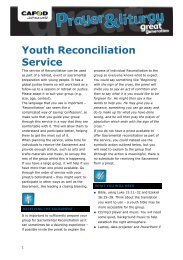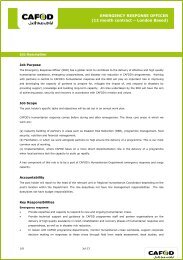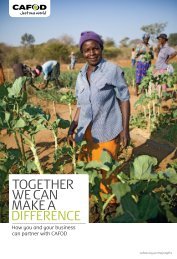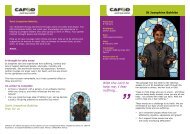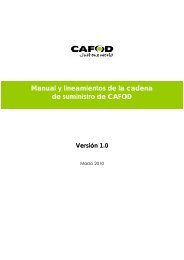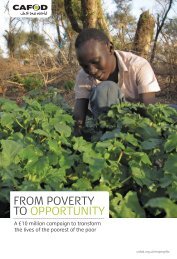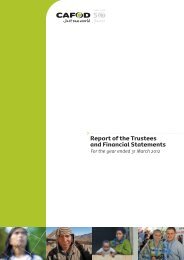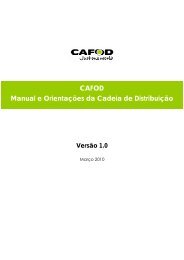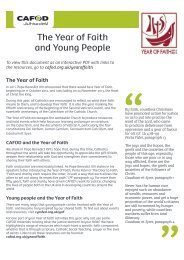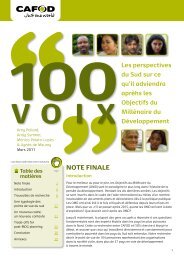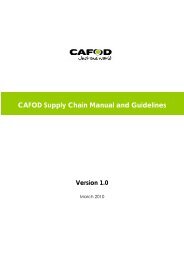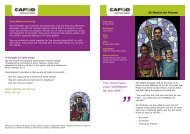Learning from NGO experiences in accessing pooled funds - Cafod
Learning from NGO experiences in accessing pooled funds - Cafod
Learning from NGO experiences in accessing pooled funds - Cafod
Create successful ePaper yourself
Turn your PDF publications into a flip-book with our unique Google optimized e-Paper software.
Humanitarian <strong>pooled</strong> fund<strong>in</strong>g mechanisms: <strong>Learn<strong>in</strong>g</strong> <strong>from</strong> <strong>NGO</strong> <strong>experiences</strong> <strong>in</strong><br />
access<strong>in</strong>g <strong>pooled</strong> <strong>funds</strong><br />
Anne Street<br />
Senior Humanitarian Policy Advisor,<br />
CAFOD<br />
This presentation looks at the Project’s <strong>experiences</strong> <strong>in</strong> humanitarian f<strong>in</strong>anc<strong>in</strong>g,<br />
specifically the <strong>pooled</strong> <strong>funds</strong>. It identifies some achievements as well as gaps and<br />
suggests some ways forward <strong>from</strong> the experience of the Project <strong>in</strong> the 4 focus<br />
countries. Research and experience suggest that these are shared beyond the focus<br />
countries.<br />
This presentation looks at two ma<strong>in</strong> issues relat<strong>in</strong>g to humanitarian f<strong>in</strong>anc<strong>in</strong>g<br />
1. Agility and availability of fund<strong>in</strong>g<br />
2. Partnership with, and access of, N<strong>NGO</strong>s to <strong>pooled</strong> <strong>funds</strong><br />
Agility of Fund<strong>in</strong>g:<br />
In Ethiopia the humanitarian Response Fund is the fastest mechanism for provid<strong>in</strong>g<br />
emergency fund<strong>in</strong>g. The time between project submission and approval can be as<br />
short as two weeks – compared to a month or more with most bilateral humanitarian<br />
donors. In contrast <strong>NGO</strong>s <strong>in</strong> Zimbabwe are f<strong>in</strong>d<strong>in</strong>g that they can wait up to six<br />
months after projects are submitted for CERF fund<strong>in</strong>g before UN agencies pass on the<br />
money.<br />
Donor support for the Pooled Funds:<br />
A number of donors have consistently funded the <strong>pooled</strong> <strong>funds</strong>, both the CERF, the<br />
CHFs and the country-level Emergency Response Funds.<br />
In Afghanistan donor support for the newly launched ERF which was set up <strong>in</strong><br />
January 2010 was slow to trickle <strong>in</strong>. The <strong>in</strong>itial target for the fund was 5 million USD,<br />
although when the NHRP made a plea to donors to support the fund <strong>in</strong> May of this<br />
year only one donor, Swedish Sida, had contributed with a sum of just under US$3.5<br />
million <strong>in</strong> 2009. S<strong>in</strong>ce then Norway has given 700,000 USD with a promise of a<br />
further 611,000; Australia has promised 422,000 and IrishAid just under half a million<br />
US$ 1 although neither have yet delivered on their pledges, accord<strong>in</strong>g to the F<strong>in</strong>ancial<br />
Track<strong>in</strong>g Service. Nevertheless even 5 million USD is dwarfed by the level of<br />
humanitarian need <strong>in</strong> the country and the cost of projects apply<strong>in</strong>g for fund<strong>in</strong>g: 64<br />
million USD <strong>in</strong> 20 proposals (17 <strong>from</strong> national <strong>NGO</strong>s and 3 <strong>from</strong> I<strong>NGO</strong>s by May<br />
2010)<br />
1 http://fts.unocha.org/reports/daily/ocha_R10_E15746_asof___1010181746.pdf F<strong>in</strong>ancial track<strong>in</strong>g<br />
service October 18 th 2010
Is partnership work<strong>in</strong>g <strong>in</strong> practice<br />
In all four focus countries <strong>pooled</strong> fund staff have made efforts to br<strong>in</strong>g <strong>NGO</strong>s <strong>in</strong>to the<br />
decision mak<strong>in</strong>g processes of the <strong>funds</strong>. In DRC, <strong>NGO</strong>s sit on the CHF Board, and <strong>in</strong><br />
Ethiopia at the end of 2009, 3 <strong>in</strong>ternational <strong>NGO</strong>s and the Ethiopian Red Cross were<br />
members of the HRF Review Board along with UN agencies and OCHA fund<br />
adm<strong>in</strong>istrators. In Afghanistan, <strong>NGO</strong>s were <strong>in</strong>vited <strong>in</strong> 2009 to participate <strong>in</strong> the<br />
advisory board for the new ERF which was established <strong>in</strong> January of 2010.<br />
On the other hand, the <strong>NGO</strong>s and Humanitarian Reform Project staff have found that<br />
there is often a discrepancy between the way <strong>NGO</strong> <strong>pooled</strong> fund projects are<br />
monitored and those of UN agencies. For example <strong>in</strong> DRC, <strong>NGO</strong>s cont<strong>in</strong>ue to raise<br />
the fact that their projects are more closely audited than UN agency projects. Over the<br />
course of the project’s life-time, however, there has been an <strong>in</strong>crease <strong>in</strong> the number of<br />
documented cases of UN agencies fail<strong>in</strong>g to abide by UNDP report<strong>in</strong>g requirements,<br />
which are then constra<strong>in</strong>ed <strong>in</strong> the next round of <strong>pooled</strong> fund allocations, which may<br />
be a sign that the accountability of UN agencies is <strong>in</strong>creas<strong>in</strong>gly under scrut<strong>in</strong>y. Last<br />
year, <strong>in</strong> Zimbabwe the ERF charter (<strong>in</strong>accurately) stated that UN agencies and IOM<br />
will provide project reports as per the terms of the MOU while <strong>NGO</strong>s had to provide<br />
2 reports one mid-term and one end of project. Project staff raised this discrepancy<br />
with OCHA and the ERF manager at OCHA agreed to rectify the mistake. As a result,<br />
all fund recipients were subsequently subjected to the same report<strong>in</strong>g requirements.<br />
In Ethiopia, the HRF guidel<strong>in</strong>es require agencies to participate <strong>in</strong> <strong>in</strong>-country regional<br />
coord<strong>in</strong>ation mechanisms as a prerequisite to receiv<strong>in</strong>g fund<strong>in</strong>g. While this condition<br />
is not closely monitored, there have been <strong>in</strong>stances where the HRF team has found<br />
that fund recipients are not attend<strong>in</strong>g these regional meet<strong>in</strong>gs and, referr<strong>in</strong>g to the<br />
HRF guidel<strong>in</strong>es, have required that the agency adhere to the requirements and attend.<br />
The fact that this policy is written <strong>in</strong>to the guidel<strong>in</strong>es makes it a potentially useful tool<br />
<strong>in</strong> the promotion of partnership and improved coord<strong>in</strong>ation at the regional level,<br />
although improvement <strong>in</strong> its enforcement is needed. At the same time, there is a need<br />
to ensure that the regional coord<strong>in</strong>ation mechanisms are effective <strong>in</strong> improv<strong>in</strong>g<br />
response so that there is value <strong>in</strong> attend<strong>in</strong>g.<br />
In Afghanistan, the 2010 CERF underfunded round saw a marked improvement <strong>in</strong> the<br />
way humanitarian actors came together to set priorities. Across the spectrum, OCHA,<br />
cluster members, both UN and <strong>NGO</strong>s and the Humanitarian Coord<strong>in</strong>ator worked<br />
together to agree on specific sectoral and geographic priorities as well as how the<br />
fund<strong>in</strong>g would be allocated.<br />
Limited access for national <strong>NGO</strong>s cont<strong>in</strong>ues to be the norm<br />
National <strong>NGO</strong> access to the <strong>pooled</strong> fund <strong>in</strong> DRC is the highest of the four project<br />
focus countries, and dur<strong>in</strong>g the life-time of the project has seen a dramatic <strong>in</strong>crease:<br />
ris<strong>in</strong>g <strong>from</strong> 14.7% <strong>in</strong> 2009 to 23.7% <strong>in</strong> the first <strong>pooled</strong> fund allocation round <strong>in</strong> 2010.<br />
In Ethiopia, the HRF does not fund national or local <strong>NGO</strong> projects directly. However,<br />
when approached by a national <strong>NGO</strong> seek<strong>in</strong>g project <strong>funds</strong>, HRF staff have at times<br />
connected the <strong>NGO</strong> with a UN agency or <strong>in</strong>ternational <strong>NGO</strong> work<strong>in</strong>g <strong>in</strong> the region.<br />
Thus, while not directly support<strong>in</strong>g the work or capacity enhancement of national<br />
<strong>NGO</strong>s do<strong>in</strong>g humanitarian work, the HRF does support partnership-build<strong>in</strong>g between<br />
national and <strong>in</strong>ternational actors. This can help to strengthen the effectiveness as well
as the improved coord<strong>in</strong>ation of humanitarian response, as national <strong>NGO</strong>s often have<br />
greater capacity to reach remote or hard-to-access communities. Nevertheless,<br />
notwithstand<strong>in</strong>g the potential sensitivities of national <strong>NGO</strong>s directly be<strong>in</strong>g able to<br />
access the fund, there are many compell<strong>in</strong>g reasons for permitt<strong>in</strong>g national <strong>NGO</strong><br />
access. Recent efforts by the project, <strong>in</strong> conjunction with other <strong>NGO</strong>s, <strong>in</strong>clud<strong>in</strong>g<br />
ICVA, have resulted <strong>in</strong> an advocacy strategy to move towards N<strong>NGO</strong> access to the<br />
HRF. That work, however, will have to be taken forward by those rema<strong>in</strong><strong>in</strong>g <strong>in</strong>country<br />
after the end of the project and will require support <strong>from</strong> donors and the UN if<br />
the rhetoric of humanitarian partnership is to become reality.<br />
Obstacles to national <strong>NGO</strong>s:<br />
National <strong>NGO</strong>s provid<strong>in</strong>g humanitarian relief often do not have the reach or capacity<br />
of their <strong>in</strong>ternational counterparts, with the result that there is sometimes a perception<br />
amongst <strong>pooled</strong> fund managers or their advisory boards that they are not capable of<br />
successfully implement<strong>in</strong>g projects with <strong>pooled</strong> <strong>funds</strong>. Yet there is no provision<br />
with<strong>in</strong> the <strong>pooled</strong> <strong>funds</strong> for capacity build<strong>in</strong>g for national actors, despite <strong>in</strong>ternational<br />
<strong>NGO</strong>s’ advocacy. In the case of DRC, the Pooled Fund Unit and most <strong>pooled</strong> fund<br />
donors have not been receptive to capacity build<strong>in</strong>g be<strong>in</strong>g part of its remit. The task is<br />
typically left to <strong>in</strong>ternational actors, for example the work which CAFOD has<br />
undertaken to support its national partner Caritas Goma to successfully apply for<br />
accreditation to enable it to apply for HRF fund<strong>in</strong>g <strong>in</strong> DRC.<br />
In Haiti, <strong>in</strong> 2010 the ERRF provided only 2 grants to national <strong>NGO</strong>s between January<br />
and July, despite a turnover of more than $76 million. Although <strong>in</strong> this case the<br />
OCHA <strong>pooled</strong> fund manager <strong>in</strong>formally worked with some national <strong>NGO</strong>s to support<br />
them <strong>in</strong> their applications, there was no formal process <strong>in</strong> place to enable her to do so<br />
<strong>in</strong> a more systematic way. The project has produced guidance material for local and<br />
national <strong>NGO</strong>s and a workshop hosted by ActionAid <strong>in</strong> September will hopefully help<br />
them to better understand how to adhere to the ERRF guidel<strong>in</strong>es and successfully<br />
apply for more grants.<br />
A less transparent reason for national <strong>NGO</strong>s be<strong>in</strong>g excluded is the fact that <strong>pooled</strong><br />
fund units have limited evaluation capacity, and process<strong>in</strong>g a handful of large project<br />
applications is more feasible than deal<strong>in</strong>g with numerous smaller applications. Are<br />
there ways to adapt the monitor<strong>in</strong>g and evaluation capacity of <strong>pooled</strong> <strong>funds</strong> to allow<br />
for more projects to be funded, thus allow<strong>in</strong>g national <strong>NGO</strong>s more access to them<br />
Could, for example, <strong>in</strong>novative means of Monitor<strong>in</strong>g and Evaluation be <strong>in</strong>troduced,<br />
which could <strong>in</strong>clude work<strong>in</strong>g with UN and I<strong>NGO</strong> partners to relieve the burden of M<br />
and E <strong>from</strong> <strong>pooled</strong> fund managers<br />
Furthermore national <strong>NGO</strong>s often do not participate <strong>in</strong> the HCTs, prov<strong>in</strong>cial<br />
<strong>in</strong>teragency committees, the <strong>in</strong>tercluster meet<strong>in</strong>gs or other fora where allocations and<br />
priorities may be discussed.<br />
There may also be a challenge to <strong>in</strong>ternational <strong>NGO</strong>s themselves who often<br />
subcontract to national partners, thus tak<strong>in</strong>g their own adm<strong>in</strong>istrative fee <strong>in</strong> project<br />
overheads, as well as ma<strong>in</strong>ta<strong>in</strong><strong>in</strong>g humanitarian activity. Are we as <strong>in</strong>ternational<br />
<strong>NGO</strong>s do<strong>in</strong>g enough to support our own partners’ access to the <strong>funds</strong>, and not<br />
supplant<strong>in</strong>g them or accept<strong>in</strong>g the status quo that they can only access <strong>funds</strong> via an<br />
accredited <strong>in</strong>ternational <strong>NGO</strong>
There rema<strong>in</strong>s much work to be done by not only I<strong>NGO</strong>s, but also UN agencies and<br />
donors to ensure that we provide better support to N<strong>NGO</strong>s so that they can more<br />
consistently access <strong>pooled</strong> <strong>funds</strong>. We have learned some lessons of what works well,<br />
but there is much more to be done and that learn<strong>in</strong>g needs to be transferred and built<br />
upon.<br />
Geneva<br />
October 21 st 2010



